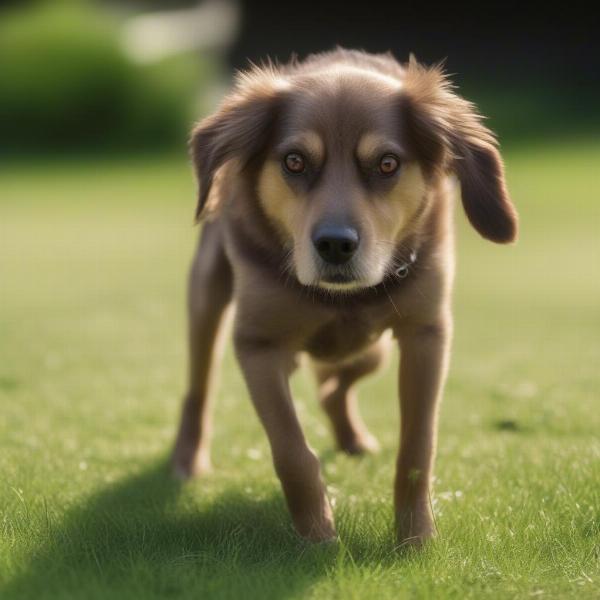Balloon dog poop refers to the fecal matter of dogs that is unusually large and round, resembling a small balloon. This can be a sign of several underlying health issues or simply a result of diet. Understanding what’s normal and what’s not when it comes to your dog’s poop can help you identify potential problems early on and ensure your furry friend stays healthy. This article will explore the possible causes of balloon dog poop, what to look for, and when to seek veterinary advice.
Constipation is a common culprit behind balloon-like stools. When a dog is constipated, their poop becomes hard and dry as it spends more time in the colon. This can lead to larger, rounder stools that are difficult to pass. Diet also plays a significant role. A diet low in fiber can contribute to constipation and the formation of balloon-like poop. Conversely, a diet too high in fiber can also cause issues, leading to loose stools or diarrhea. Identifying other symptoms alongside the unusual stool appearance is crucial.
Causes of Balloon Dog Poop
Several factors can contribute to balloon-shaped dog poop. Let’s delve into the most common ones:
Constipation
As mentioned, constipation is a primary cause. A dog struggling with constipation will strain to defecate and may produce small, hard, and round droppings.
Dehydration
Dehydration can exacerbate constipation, making the stool even harder and more difficult to pass. Make sure your dog has access to fresh, clean water at all times.
Diet
A diet lacking in fiber or containing ingredients that are difficult to digest can also lead to balloon-like stools.
Obstruction
In some cases, a foreign object lodged in the digestive tract can cause the stool to form around it, resulting in an unusually shaped poop. This is a serious issue requiring immediate veterinary attention.
 Dog struggling with constipation and producing balloon-like poop
Dog struggling with constipation and producing balloon-like poop
Identifying Other Symptoms
While balloon-like poop can be concerning, it’s important to consider other accompanying symptoms to get a clearer picture of your dog’s health.
Lethargy
A lethargic dog may be experiencing discomfort or pain due to constipation or an underlying health problem.
Loss of Appetite
Changes in appetite can indicate a range of health issues, including digestive problems.
Vomiting
Vomiting can be a sign of a blockage or other serious gastrointestinal issues.
Abdominal Pain
If your dog exhibits signs of abdominal pain, such as whining, restlessness, or guarding their belly, it’s essential to seek veterinary care immediately.
When to Seek Veterinary Advice
If your dog’s balloon-like poop is a one-off occurrence and they are otherwise acting normally, it might not be cause for immediate concern. However, if the unusual stool persists, or if it’s accompanied by other symptoms like those mentioned above, it’s crucial to consult a veterinarian.
“It’s always better to be safe than sorry,” says Dr. Emily Carter, DVM, a veterinary specialist with over 15 years of experience. “If you’re at all concerned about your dog’s bowel movements, don’t hesitate to contact your vet.”
Diagnosis and Treatment
Your veterinarian will likely perform a physical examination and may recommend further diagnostic tests, such as blood work, X-rays, or ultrasound, to determine the underlying cause of the problem. Treatment will depend on the diagnosis and may include dietary changes, medication, or even surgery in severe cases.
Conclusion
Balloon dog poop can be a sign of several different issues, ranging from simple constipation to more serious conditions. Paying attention to your dog’s bowel movements and any accompanying symptoms is crucial for early detection and appropriate treatment. If you notice your dog producing unusually shaped stools or exhibiting other signs of illness, don’t hesitate to contact your veterinarian. Early intervention is key to ensuring your furry friend stays happy and healthy.
FAQ
- What is the normal consistency of dog poop? Normal dog poop should be firm but not hard, and it should be easy to pick up.
- How often should a dog poop? Most dogs poop once or twice a day, but this can vary depending on factors like diet and exercise.
- Can stress cause changes in dog poop? Yes, stress can affect a dog’s digestive system and lead to changes in stool consistency.
- Is it normal for dog poop to change color occasionally? Slight variations in color can be normal, but significant or persistent changes should be investigated by a vet.
- What should I feed my dog to prevent constipation? A diet rich in fiber and plenty of fresh water can help prevent constipation.
- What are some signs of a bowel obstruction in dogs? Vomiting, loss of appetite, abdominal pain, and straining to defecate are all potential signs of a bowel obstruction.
- When should I be concerned about changes in my dog’s poop? If the changes persist for more than a day or two, or if they are accompanied by other symptoms, it’s time to see a vet.
ILM Dog is your trusted resource for all things dog-related. We offer expert advice on everything from breed selection and health care to training and nutrition. From puppy care to senior dog care, our goal is to provide you with the information you need to keep your canine companion happy and healthy. For more in-depth information on dog health, nutrition, and behavior, visit ILM Dog. Contact us at [email protected] or +44 20-3965-8624.